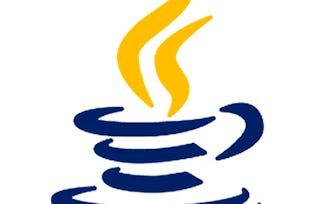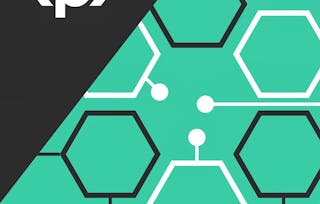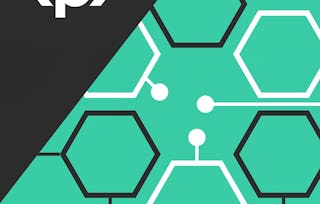Ce cours propose une introduction au langage Java et à la programmation orientée objet, y compris une vue d'ensemble de la syntaxe Java et de ses différences par rapport à un langage comme Python. Les étudiants apprendront à écrire des classes et des méthodes Java personnalisées et à tester leur code à l'aide de tests unitaires et d'un développement piloté par les tests. Les sujets abordés comprennent les structures de données de base telles que les tableaux et les listes de tableaux, ainsi que la surcharge des méthodes.

Introduction à Java et à la programmation orientée objet

Introduction à Java et à la programmation orientée objet
Ce cours fait partie de Spécialisation Introduction à la programmation avec Python et Java

Instructeur : Brandon Krakowsky
42 180 déjà inscrits
Inclus avec
332 reviews
Expérience recommandée
Ce que vous apprendrez
Identifier les aspects fondamentaux de la programmation orientée objet et les caractéristiques du langage Java.
Utilisez Eclipse pour écrire et exécuter du code Java.
Développer des programmes qui utilisent des collections Java et appliquer les concepts fondamentaux de la programmation orientée objet en utilisant les classes, le polymorphisme et la surcharge des méthodes.
Tester le code en appliquant les principes du développement piloté par les tests à l'aide du cadre de test unitaire de Java.
Compétences que vous acquerrez
- Catégorie : Conception orientée objet
- Catégorie : Programmation Java
- Catégorie : Test de logiciels
- Catégorie : Développement d'applications
- Catégorie : Java
- Catégorie : Programmation orientée objet (POO)
- Catégorie : Tests unitaires
- Catégorie : Principes de programmation
- Catégorie : Programmation Informatique
- Catégorie : structures de données
- Catégorie : Développement piloté par les tests (TDD)
Détails à connaître

Ajouter à votre profil LinkedIn
7 devoirs
Découvrez comment les employés des entreprises prestigieuses maîtrisent des compétences recherchées

Élaborez votre expertise du sujet
- Apprenez de nouveaux concepts auprès d'experts du secteur
- Acquérez une compréhension de base d'un sujet ou d'un outil
- Développez des compétences professionnelles avec des projets pratiques
- Obtenez un certificat professionnel partageable

Il y a 3 modules dans ce cours
Bienvenue à Java ! Ce premier module propose une introduction au langage Java et à la programmation orientée objet. Il comprend une vue d'ensemble de la syntaxe de Java, en particulier de ses différences avec un langage comme Python. Les sujets abordés comprennent les variables et les types de données, les boucles et les conditionnelles, l'impression sur la console, l'analyse de l'entrée de l'utilisateur et la documentation du code. Ce module explique également la structure et le fonctionnement interne d'une classe Java et vous apprend à définir vos propres classes et méthodes personnalisées.
Inclus
38 vidéos10 lectures3 devoirs2 éléments d'application
Dans ce module, vous apprendrez à tester votre code pour le faire fonctionner. La meilleure façon d'y parvenir est d'écrire un ensemble de tests unitaires que vous pouvez exécuter sur votre programme, à tout moment. Dans ce module, nous apprendrons comment effectuer des tests unitaires en Java, et pourquoi nous voulons le faire. Nous apprendrons également tout sur les tableaux Java, qui sont des collections d'éléments, et sur les ArrayLists, qui sont un peu comme des tableaux, mais beaucoup plus flexibles. Ces derniers fonctionnent comme les listes en Python. Les ArrayLists font partie du cadre plus large des Collections de Java, auquel nous continuerons à faire référence tout au long de ce cours.
Inclus
23 vidéos5 lectures2 devoirs2 éléments d'application
Jusqu'à présent, nous avons défini des variables en tant que variables d'instance dans nos classes Java. Les variables d'instance sont simplement des variables définies à l'intérieur d'une classe, et chaque instance d'une classe peut avoir une valeur différente pour une variable d'instance. Dans ce module, nous allons nous intéresser à la définition des variables statiques dans nos classes Java. Les variables statiques sont également définies comme des variables à l'intérieur d'une classe, mais avec le mot-clé "static". Les variables statiques ont la même valeur pour chaque instance d'une classe. En fait, il n'est même pas nécessaire de créer une instance d'une classe pour utiliser une variable statique ! Nous examinerons également les méthodes statiques. Tout comme les variables statiques, vous n'avez pas besoin de créer une instance d'une classe pour utiliser ou appeler une méthode statique. Dans ce module, nous allons également introduire le polymorphisme, qui fait référence à la surcharge et à la superposition. Nous nous concentrerons sur la surcharge, qui consiste à avoir deux méthodes ou plus dans la même classe, avec le même nom.
Inclus
21 vidéos2 lectures2 devoirs1 élément d'application
Obtenez un certificat professionnel
Ajoutez ce titre à votre profil LinkedIn, à votre curriculum vitae ou à votre CV. Partagez-le sur les médias sociaux et dans votre évaluation des performances.
Instructeur

Offert par
En savoir plus sur Développement de logiciels
 Statut : Essai gratuit
Statut : Essai gratuit Statut : Essai gratuit
Statut : Essai gratuit Statut : Essai gratuit
Statut : Essai gratuit
Birla Institute of Technology & Science, Pilani
Pour quelles raisons les étudiants sur Coursera nous choisissent-ils pour leur carrière ?

Felipe M.

Jennifer J.

Larry W.

Chaitanya A.
Avis des étudiants
- 5 stars
67,77 %
- 4 stars
21,08 %
- 3 stars
5,42 %
- 2 stars
1,80 %
- 1 star
3,91 %
Affichage de 3 sur 332
Révisé le 26 juin 2023
The lecturer was excellent. his teaching style is very smart and understanable to everyone,and explanation part is also great. wish to learn from him again.
Révisé le 2 nov. 2022
Amazing course and really , really usefull for professional coding , thank you so much for providing me financial aid really loved the experience
Révisé le 28 mai 2022
A 10 out of 10 course. Very well designed and the assignments are great for enhancing learning and understanding.

Ouvrez de nouvelles portes avec Coursera Plus
Accès illimité à 10,000+ cours de niveau international, projets pratiques et programmes de certification prêts à l'emploi - tous inclus dans votre abonnement.
Faites progresser votre carrière avec un diplôme en ligne
Obtenez un diplôme auprès d’universités de renommée mondiale - 100 % en ligne
Rejoignez plus de 3 400 entreprises mondiales qui ont choisi Coursera pour les affaires
Améliorez les compétences de vos employés pour exceller dans l’économie numérique
Foire Aux Questions
Les seules mathématiques dont les apprenants auront besoin pour cette Specializations sont l'arithmétique et des concepts de base en logique.
Si vous avez apprécié ce cours, nous vous recommandons les cours 1, 2 et 4 de la série !
Si vous souhaitez apprendre les bases de l'informatique au-delà des bases de la programmation, envisagez de vous inscrire au Master of Computer and Information and Technology (MCIT) de l'Université de Pennsylvanie, un programme de master en informatique de l'Ivy League destiné aux personnes n'ayant pas de formation en informatique. Pour une expérience sur le campus, explorez ici. Si vous préférez un environnement en ligne, postulez au MCIT en ligne. En fait, les cours de cette série sont également utilisés dans le cadre du programme de diplôme en ligne ! Le certificat de Specializations sera considéré favorablement par le comité d'admission, n'oubliez donc pas de le mentionner lors de votre candidature.
Pour accéder aux supports de cours, aux devoirs et pour obtenir un certificat, vous devez acheter l'expérience de certificat lorsque vous vous inscrivez à un cours. Vous pouvez essayer un essai gratuit ou demander une aide financière. Le cours peut proposer l'option "Cours complet, pas de certificat". Cette option vous permet de consulter tous les supports de cours, de soumettre les évaluations requises et d'obtenir une note finale. Cela signifie également que vous ne pourrez pas acheter un certificat d'expérience.
Plus de questions
Aide financière disponible,

